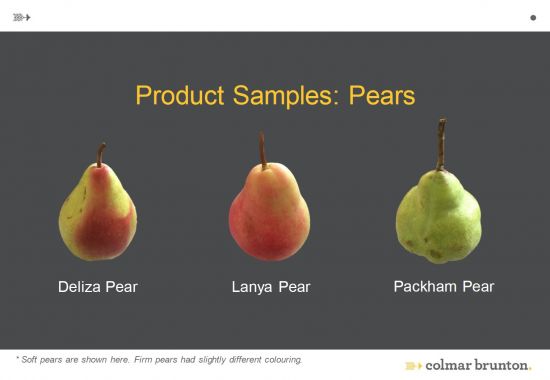The Australian fruit market is growing, especially the export market to Asia. The lucrative markets in Thailand and Indonesia provide an enormous opportunity for Australian pear producers to capitalise on the positive perceptions of Australian-grown produce in these countries. Little was known about consumer preference and drivers for choosing pears in Indonesia and Thailand.

Research Objectives:
- To understand the appeal of ANP-0131 (marketed as Ricō®, previously known as Deliza®) and ANP-0118 (Lanya®) Pears, current and future usage, and purchase behaviour of pears.
- Determine likability of texture, sweetness and crunch, and determine triggers and barriers to usage and purchase.
The research objectives focus on understanding consumer preferences that will influence pre and post harvest decisions that produce fruit for markets and consumers across Asia. This will grow market opportunities by delivering fruit that match consumer expectations.
Pear consumer testing – Indonesia & Thailand
Consumer preference study for pears in Indonesia and Thailand Download PDF in new window (Note: this document does not meet WCAG 2.0 accessibility guidelines)
Export markets reveal a taste for Australian pears
Australian fruit growers and marketers have a better understanding of what international consumers are looking for when purchasing fruit, thanks to a series of consumer preference surveys carried out in Thailand and Indonesia.
Agriculture Victoria Project Manager, Bruce Tomkins said there were huge opportunities to grow the market for Australian pears in both countries.
“To do this however, marketers need to understand what shoppers want and prices they are willing to pay,” Mr Tomkins said.
“‘Australian grown’ was identified as a key driver for sales in all markets, but we need to provide the right cultivar of fruit, with the right physical attributes, including colour, texture and taste, at the right price,” he said.
Mr Tomkins also said now Australia had legal market access to mainland China, exports could be shipped directly to their target markets, giving Australian growers and marketers more supply chain control and influence over the condition of their product when it reached consumers.
The study looked at two new pears ANP-0131 (marketed as Ricō®, previously known as Deliza®) and ANP-0118 Lanya® in Thailand and Indonesia and compared them to the well-known Packham pear. Key findings included:
- A price point under 70,000 IDR (AU1 $6.51) per kg for Indonesia and under 269 TBH (AU$10.831) per kg for Thailand is preferred.
- International supermarkets are where Indonesians like to buy fruit. Fresh Markets are the choice of Thai consumers.
- Indonesian and Thai consumers prefer to buy pears individually in loose formats one to three times per week.
- Consumers in Indonesia like to buy pears because they are healthy, and the whole family likes them. Thai consumers buy pears because they taste great and are versatile.
(1 XE Currency conversion as at 12 January 2018)
“The information collected is being used by industry to make decisions on what fruit to invest in and grow for export,” Mr Tomkins said.
“The information is also being shared with retailers in export markets to help ensure Australian fruit is stored, handled, displayed and promoted to maximise sales.”
Full copies of the Consumer Preference research reports are available to members of Apple & Pear Australia Limited (APAL). For a full copy of the Pear consumer preferences report, please contact APAL (http://apal.org.au/consumer-research/)

Bruce Tomkins Agribo, Bundoora. Agriculture Victoria
The study, funded by the Australian Government through the Rural Research and Development for Profit program, with co-investment from Horticulture Innovation Australia and Agriculture Victoria.

Help for Australian Business: Fresh fruit and vegetable exporters.
See what services, toolkits and grants AusTrade offer exporters, big and small.
Related research
-
 Blush pear research orchard
Blush pear research orchard
-
 Fruit Bud Development
Fruit Bud Development
-
 Intensive pear production
Intensive pear production
-
 Pear planting systems experiments
Pear planting systems experiments
-
 Pear rootstock experiments
Pear rootstock experiments
-
 Pear irrigation experiments
Pear irrigation experiments
-
 Pear cordon tree training demonstrations
Pear cordon tree training demonstrations
-
 Pear post-harvest ripening and storage
Pear post-harvest ripening and storage
-
 Blush pear economic feasibility
Blush pear economic feasibility
-
 Pear tree training & pruning techniques
Pear tree training & pruning techniques
-
 Blush pear international research & collaboration
Blush pear international research & collaboration
-
 Blush development in pears. Part 1 - light & temperature
Blush development in pears. Part 1 - light & temperature
-
 Blush development in pears. Part 2 - orchard practices
Blush development in pears. Part 2 - orchard practices